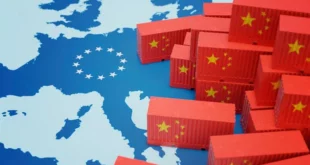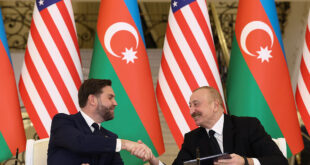The scene at the entrance to Ingushetia’s second-largest town Karabulak is menacing. The traffic checkpoint has been reinforced and is now manned by federal troops in armoured vehicles.
![]()
The road is obstructed by concrete blocks forcing drivers to weave around before approaching the striped barrier, where a warning sign says, “Drivers, stop! Turn off your engine and allow your car to be inspected.â€
An armoured personnel carrier covers the road while soldiers and policemen select vehicles, check the passengers’ documents and rummage through the car interiors.
This is just like what Chechnya looked like a few years ago. But in neighbouring Chechnya, where rebels have fought two bitter wars against Russian troops since the end of Soviet Union, calm is returning. Ingushetia, home to the Chechens’ ethnic kin, once had a reputation for being relatively peaceful. That has all changed.
A series of bombings and murders this summer provoked Moscow into sending extra troops. Checkpoints have been set up outside all the major towns and villages.
One typical killing was on the evening of September 17 near the village of Gazi-Yurt when a FSB agent, Major Alikhan Kalimatov, was murdered by unknown gunmen. A fellow traveller was seriously injured and hospitalised. The attackers, as is now routine, escaped.
“To me, the scariest thing is not that this series of murders and attacks has started, but that we’ve started to get used to it. Shoot-outs in the streets, these so-called ‘mop-up operations’, illegal detention of citizens, and soldiers armed to the teeth, it’s just normal now,†said Tamila Barakhoyeva, a resident of Nazran.
“People are scared, because no one knows what might happen tomorrow or even in an hour. But we can’t affect the situation in any way. Not long ago, the authorities banned anyone from holding protest meetings or demonstrations. I am scared that that might be the start of a ‘counter-terrorist operation’ like the one that was in Chechnya. I have two grown-up children. What will happen to them?â€
Ingushetia, which until recently appeared to be a little island of stability and calm in the region, started to see a marked deterioration this spring. Some people blame an excessive reaction by security services to the kidnapping of Uruskhan Zyazikov, the elderly uncle of regional president Murat Zyazikov.
“I think everything started here in March, after that kidnapping. After that the president’s security service, which is led by the kidnapped man’s son, started to conduct endless raids,†said Kureish Yevloev, a 33-year-old local resident.
“The army joined in with ‘mop-up operations’, ‘special operations’ and detentions. And then the attacks on policemen started. Zyazikov’s home was attacked, his adviser Bakha Vedzhizev was killed, Russian-speaking residents of the region started to be killed. Some people say it’s the rebels who are to blame but other people think it’s the solders and policemen doing this on purpose to create a ‘second Chechnya’.â€
Moscow reacted to the attacks on policemen, and the murder of a Russian family on July 18, by rushing officers from the interior ministry to the region to shore up security. A few days later, the FSB building in Magas, in the very heart of Ingushetia’s administrative capital, was attacked.
On August 8, more than 2,500 federal soldiers were sent to Ingushetia, along with armoured vehicles. But this did not help. Several more Russian-speaking residents, including Dagestanis and Gypsies, were murdered. Policemen and soldiers were attacked.
Many Ingushetia residents are convinced that the arrival of the soldiers actually made the situation worse. They say there weren’t any serious attacks on police in the village of Malgobek before the Russian interior ministry set up camp there. The same thing happened in the Nazran region. The soldiers’ camps and checkpoints are regularly assaulted by unknown gunmen.
“The arrival of additional troops is impossible to justify. Since November, we’ve already had the Russian interior ministry’s temporary operational group under Major-General Gennady Ivanov here anyway. Every police station has 25 to 30 extra interior ministry personnel. There’s already what you could call a parallel interior ministry,†said Magomed Mutsolgov, chairman of the MAShR human rights group.
“But this situation, like the arrival of the new units, not only does not stabilise the situation, but actually makes it worse. Members of these interior ministry units have already conducted several kidnaps and murders of young men.â€
Dmitry Kozak, President Vladimir Putin’s envoy in southern Russia, said on September 17 that the tension in Ingushetia is connected to the forthcoming elections to the State Duma’s lower house of parliament.
“We have long predicted that this would happen, and it is natural in the pre-electoral conditions,†he told reporters. “Every political force wanting to come to power will exploit the situation to its advantage. This is completely natural and we are prepared for it.
“It’s pointless constantly appealing to people’s conscience, you need to deploy punitive force as well.â€
Other officials are equally sanguine. President Murat Zyazikov, himself a former general in the FSB, told the Russian newspaper Izvestia that the media was exaggerating the situation.
“What we’ve seen in the media recently is a real information war against our republic which will create an image for Russia and the world of instability, of weakness in the local and federal authorities,†he said. “I would suggest these critics visit the republic and talk to its residents. There is electricity in every village, there is water, there is gas. Every village has telephones. The situation in Ingushetia is stable and under control.â€
But Aslambek Apayev, an expert on the north Caucasus from the Moscow Helsinki Group, thinks residents are seeing a concerted and well-thought-out attempt to destabilise the region.
“We are witnesses to an attempt to create tension artificially. The deployment of additional troops cannot but be a concern. I am afraid that the events here will develop on the ‘Chechen route’, which is shown by the massive ‘mop-up operations’, by the kidnappings and the illegal detentions, by the restrictions on freedom of movement and other rights violations. The situation in Ingushetia is very worrying,†he said.
 Eurasia Press & News
Eurasia Press & News



